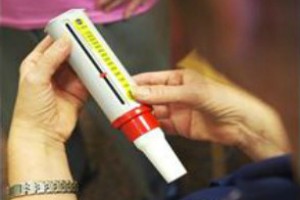Asthma-related GP appointments triple over the back-to-school period, research shows

GP asthma consultations are around three times higher over the back-to-school period thanks to a seasonal peak in asthma, research has shown.
Findings published in the Journal of Epidemiology and Community Health found a seasonal peak of asthma – connected to the start of the school year each September – was responsible for an increase in GP appointments across England.
Researchers analysed GP consultations for worsening asthma, both within and outside normal practice hours, in addition to related visits to hospital emergency care from 2012-2016.
Rates of GP in-hours appointments for asthma decreased during the school holidays, but increased in the first two to three weeks of each autumn half-term. The most extreme rise was observed at the start of the school year in September, where GP consultations were two and a half to three times higher per day than the rest of the year. Similar trends were also seen in out-of-hours services and emergency care.
The UK’s prevalence of asthma and its associated deaths and use of healthcare services are among the highest in the world, while the ‘back-to-school’ strain accounts for up to a quarter of serious bouts.
Fluctuations in weather; air pollution; the stress of starting a new school year; and seasonal increases in circulating viruses, such as rhinovirus, are believed to exacerbate the diagnosis.
Chair of the RCGP Professor Helen Stokes-Lampard said: ‘Asthma is an extremely distressing condition affecting one in 11 children, but in the majority of cases can be well-managed by parents with the support of GPs and our teams who are highly trained to identify symptoms, prescribe appropriately and monitor treatment to help patients of all ages.
‘Part of keeping symptoms under control and preventing asthma attacks can be identifying and avoiding potential ‘triggers’ such as cigarette smoke, pets or alcohol. But other triggers like pollen, pollution, and very cold or very hot weather are much harder, if not impossible, to control.
‘As this report highlights, some children find the start of the new school term an anxious time which could set off an attack in some vulnerable individuals, and there are clearly other factors at work that are not yet fully understood.’
GP and clinical lead at Asthma UK Dr Andy Whittamore said: ‘During the summer holidays, children’s asthma can be a ticking time bomb. Many fall out of the routine of taking their daily asthma medication during the summer and this, combined with an abundance of cold and flu in the autumn which are known asthma triggers, puts them at a higher risk of having a life-threatening asthma attack when they go back to school.
‘But parents can follow simple tips to keep their child safe this summer and when they go back to school. Make sure you give your child their preventer inhaler (usually brown) every day as prescribed over the summer holidays as this helps to calm the inflammation in their airways and prevents them having an asthma attack if they come into contact with one of their triggers.
‘Share your child’s written asthma action plan with anyone looking after your child over the summer and get more information on how to keep your child well from www.asthma.org.uk/back-to-school.’
Consultant epidemiologist at PHE Dr Alex Elliot said: ‘Real-time syndromic surveillance is a powerful tool to help monitor and interpret the huge amount of information gathered daily by a range of healthcare systems, which can be vital in rapidly identifying changes in the population’s health.
‘The reasons for underlying ‘back to school’ asthma are complex, most likely involving seasonal viruses and environmental factors, and a greater understanding of these elements will help design future public health approaches.’
Last year, NICE recommended a new bronchial thermoplasty for patients with severe forms of the condition, while it was recently revealed that over half of patients with asthma skip their medication due to prescription costs.
Pulse July survey
Take our July 2025 survey to potentially win £1.000 worth of tokens

Visit Pulse Reference for details on 140 symptoms, including easily searchable symptoms and categories, offering you a free platform to check symptoms and receive potential diagnoses during consultations.











